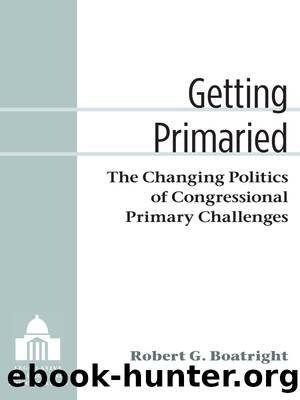Getting Primaried by Boatright Robert G.;

Author:Boatright, Robert G.;
Language: eng
Format: epub
Publisher: University of Michigan Press
4
The Consequences of Congressional Primary Challenges
As I have shown in the two previous chapters, there is little evidence to suggest that the amount of primary competition we see today is novel. Primary competition, whatever the motivation of the challenger, comes and goes in waves that correspond, to some degree, with voter unrest. There are, however, two unusual features of the primary competition for incumbents that we have seen in the 2000s. First, as chapter 2 showed, it corresponds less to the role of political parties than it once did; all wayward incumbents are equally vulnerable. Second, as I argued in chapter 3, there is a class of primary challengers today that is better funded and draws on more of a national fundraising base than was the case in the 1970s, 1980s, and 1990s.
At the beginning of this book, I posed three questions. First, is there more primary competition today than there once was? The answer to this question depends on one's baselineâare we concerned here about history or about how today's members of Congress (few of whom were in office in the 1980s) perceive primaries. Second, are primary challengers more of a threat to incumbents today than they once were? If one construes âthreatâ to entail some measure of campaign financing, the answer seems to be a qualified yes. Third, do primaries have consequences for incumbents' behavior in Congress; that is, are incumbents running scared, and do they make adjustments to ward off potential challengers or to respond to actual challengers? In this chapter, I seek to answer the third question.
Since it appears, from chapter 2, that it is difficult to find ways in which parties can effectively discourage primary competition, we should look at what incumbents do in response to it. As I shall note at the end of this chapter, however, it is not possible to conclusively measure whether incumbents modify their behavior to ward off challenges; in that case, we would be measuring the effect of potential challenges that may not actually occur. We cannot collect data regarding nonevents. We can, however, measure the consequences of the primary challenges that do happen. If incumbents who have problems treat primary opposition as a wake-up call, we might look at their responses to see if the incumbents have indeed heard the call.
As I have documented in the previous two chapters, not all primaries contain the same message. The coding of primary challenge types I have provided in the previous two chapters, however imprecise it may be, should correspond to the messages incumbents have gotten from their opponents. The incumbent Democrat who survives a strong challenge from the left or the incumbent Republican who survives a challenge from the right gets a message about his or her behavior and can respond by changing that behavior. An incumbent whose primary challenger has argued that he or she is too old, however, obviously cannot become younger; the incumbent might seek to demonstrate his or her vigor, but this is difficult to measure.
Download
This site does not store any files on its server. We only index and link to content provided by other sites. Please contact the content providers to delete copyright contents if any and email us, we'll remove relevant links or contents immediately.
The Secret History by Donna Tartt(16678)
The Social Justice Warrior Handbook by Lisa De Pasquale(11495)
Thirteen Reasons Why by Jay Asher(7808)
This Is How You Lose Her by Junot Diaz(5804)
Weapons of Math Destruction by Cathy O'Neil(5056)
Zero to One by Peter Thiel(4841)
The Myth of the Strong Leader by Archie Brown(4796)
Promise Me, Dad by Joe Biden(4462)
Beartown by Fredrik Backman(4445)
How Democracies Die by Steven Levitsky & Daniel Ziblatt(4430)
Stone's Rules by Roger Stone(4426)
The Fire Next Time by James Baldwin(4356)
100 Deadly Skills by Clint Emerson(4093)
A Higher Loyalty: Truth, Lies, and Leadership by James Comey(4044)
Rise and Kill First by Ronen Bergman(4026)
The David Icke Guide to the Global Conspiracy (and how to end it) by David Icke(3900)
The Farm by Tom Rob Smith(3884)
Secrecy World by Jake Bernstein(3793)
The Doomsday Machine by Daniel Ellsberg(3743)
